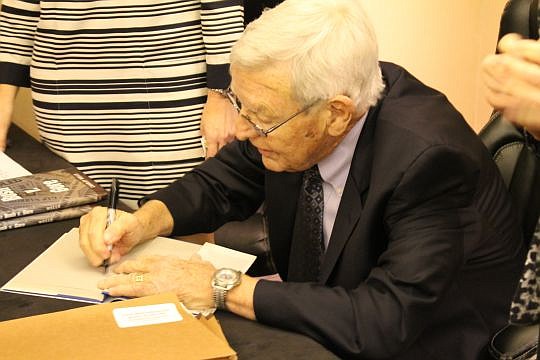
On Nov. 8, 2000, the people of the United States awoke expecting to hear the results of the presidential election between George Bush and Al Gore.
Instead, it took 35 days for courts to decide what to do about Florida, the swing state that would ultimately pick the winner. Here, a razor-thin lead for Bush had spawned lawsuits across the state over how many recounts could be held.
Charles Wells, chief justice of Florida’s Supreme Court at the time, recalled the conflicting statutes and blurred jurisdictional lines that kept the state’s highest minds from finding a quick answer. He shared the behind-the-scenes look during a Friday lunch meeting of The Jacksonville Bar Association.
It was a few days after the 2000 election when Wells realized the courts were going to have a problem. The justices had been hearing in the news all week about butterfly ballots and hanging chads.
In Daytona Beach, a county supervisor was manually recounting punch-card ballots over the weekend, because the law said she had to turn
them into the state within seven days.
Wells looked up the statute to be sure. He found one that said if a county had not sent the results to Tallahassee by seven days after the election, its votes “shall” be ignored. He found another that said if the county didn’t report by seven days, its votes “may” be ignored.
“It was then I knew lawyers
all over America were loading
up their briefcases and heading our way,” Wells said, with a chuckle, “because with a conflict as blatant as the difference between ‘may’ and ‘shall’ we were going to have to fight that out somehow.”
In the weeks that followed, protesters collected on the Florida Supreme Court’s lawn and the media established a tent city. In South Florida, citizens picketed courthouses. Cuban dictator Fidel Castro mockingly offered to send election observers.
Florida’s Supreme Court would ultimately render opinions in two major lawsuits.
In the first, the court unanimously extended the deadline for re-counting votes in three counties.
It was clear more lawsuits were coming, and the court didn’t want Florida votes to be disadvantaged by legal delay.
Bush’s team, though, promptly accused the justices of changing election law.
In the second suit, the Florida court added more late recounts to state totals and also ordered a manual recount of undervotes statewide.
For that decision, the court was split and Wells wrote the dissenting opinion. Florida had only three days to settle its election to avert a U.S. Congressional challenge, he said.
“I had come to the conclusion that the margin of victory in Florida was never going to exceed the margin of error.”
The U.S. Supreme Court reversed the Florida court’s decision the next day, effectively ending the recounts and making Bush president.
Florida would shoulder criticism for many years after its 2000 election fumbles, Wells said, but the experience had its positive outcomes.
“There was never a doubt that what was on top of those trucks across from the Florida Supreme Court would be TV antennas and not machine guns,” he said, “and that when the final court made the final decision, power would pass for the most powerful position in the world.
“It’s a great tradition in this country and I hope we continue to celebrate it.”
(904) 356-2466